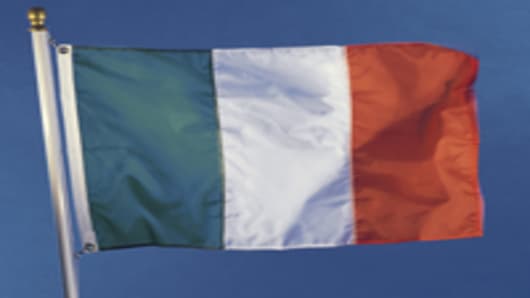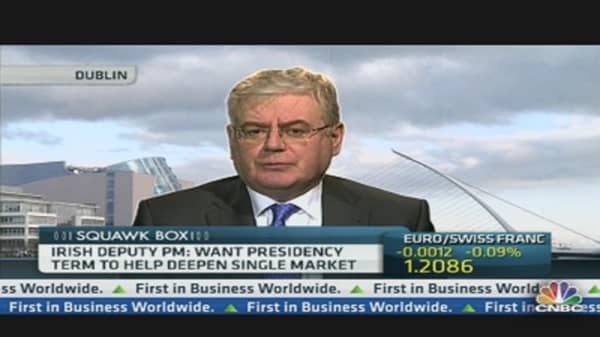Ireland will be the poster child of austerity success and will emerge from economic ruin to achieve strong growth and job creation, the country's deputy prime minister told CNBC.
The country, which has just taken over the rotating six-month presidency of the European Council, hopes to exit the EU/IMF adjustment program it entered into after requesting help in November 2010 and hopes to fully regain market access, Deputy Prime Minister of Ireland Eamon Gilmore said.
"It is important for Europe that there is a winner," he told CNBC Wednesday.
"That there is a euro zone country that emerges from a program, that achieves growth and that recovers and Ireland is certainly the best candidate for that."
Prime Minister Enda Kenny was joined by other senior politicians including Gilmore on Monday at a Dublin Castle ceremony to mark the beginning of Ireland's six-month presidency of the European Council, the seventh time it has held the post.
"We hope to continue the stabilization of the euro and the financial system in Europe. And to press ahead with measures that will promote jobs and growth in Europe," Gilmore said.
(Read More: Irish PM Eyes Debt Deal, Full Market Return in 2013)
Unemployment has plagued the Irish economy and remains around the 15 percent mark according to the Central Statistics Office, despite progress on an austerity program that still has three years left to run.
Approved in December 2010, the Troika program for Ireland provides up to 50 billion euros ($66 billion) in financial support and up to 35 billion in banking support measures between 2011 and the end of 2013. Ireland became only the second country after Greece to ask for such financial help after the financial crash of 2008.
It has since seen slower growth than originally estimated (an expected 0.9 percent in 2012) but has been commended by the International Monetary Fund (IMF) for the way it has implemented tough austerity measures. The IMF said in December that it could delay some of the required budget cuts if growth continues to falter.
"Our plan is to exit the EU/IMF program in 2013. We are making progress. By the end of 2013 we will have completed about 85 percent of the budget adjustment that is required," Gilmore said.
"The Irish economy has returned to growth, it's small growth, it's still very fragile."
(Read More: Why Ireland Could Soon Exit Europe's PIIGS Nations)
The deepening of the European single market will also be a key issue in the next six month, according to Gilmore, and areas Ireland are looking to push ahead with include data protection, cyber security, portability of pensions, the posting of worker and jobs in the digital sectors.
"There are also a number of trade agreements that we plan to move ahead with, in the United States, Canada, Japan, Singapore," he said.
"It has the potential to add about 2 percent to the (growth domestic product) GDP of Europe."




